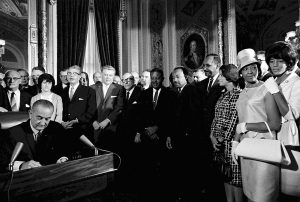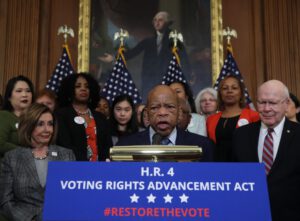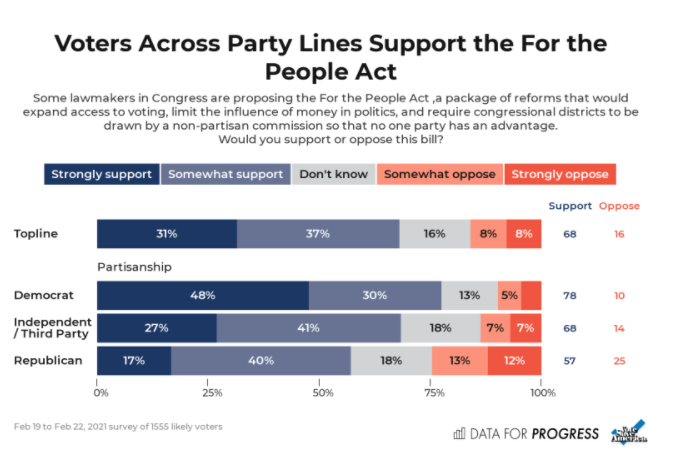Blog Post
Should Congress pass the For the People Act or John Lewis Voting Rights Advancement Act? Answer: They must pass both.
UPDATE September 2021: The newly introduced Batas sa Kalayaan sa Pagboto contains many of the same provisions as the For the People Act — and passing both pieces of legislation is still necessary to protect our rights.
There is a lot of chatter out there about why Congress is taking action on the For the People Act instead of trying to pass the John Lewis Voting Rights Advancement Act first. Some people are even questioning why the John Lewis Voting Rights Advancement Act is not included in the For the People Act, or what the differences between the two bills are. The truth is both of these bills are critically important to protecting our freedom to vote and Congress must pass both of them.
Now, you probably have some questions. Don’t worry, we’ve got some answers for you.
Let’s start with the For the People Act, introduced in Congress as H.R. 1 and S. 1.
The For the People Act is a comprehensive package of bold solutions to strengthen our democracy and give more power to everyday people. The bill has three pillars:
- Voting & elections: The For the People Act includes innovative solutions to make our elections more safe, accessible, and fair, and sets important national standards to guarantee all eligible Americans’ right to vote, regardless of our zip code, race, or background. It includes things like automatic voter registration, expanding absentee voting, guaranteeing the ability to vote early, blocking voter purges, and restoring the right to vote to people who have completed their felony sentences. It also includes a number of provisions to combat partisan gerrymandering, including new transparency requirements and the creation of independent citizens redistricting commissions that must draw maps that comply with the Constitution and Voting Rights Act and do not favor or disfavor political parties.
- Money in politics: The For the People Act also offers a number of solutions to limit the influence of wealthy special interests and big political donors by creating a new small-donor focused citizen funded elections program, increasing disclosure requirements for dark money groups, strengthening the oversight and enforcement of our campaign finance laws by restructuring the Federal Election Commission, and creating new rules to stop coordination between candidates and Super PACs.
- Ethics & accountability: The For the People Act also includes measures to strengthen government ethics by expanding conflicts of interest laws for government officials, closing loopholes and increasing disclosure requirements for lobbyists, strengthening the Office of Government Ethics so it can enforce the law, creating a code of ethics for U.S. Supreme Court justices, and requiring presidential and vice presidential candidates to disclose their tax returns.
There is a lot in the For the People Act, but each part of the bill is crucial and all the solutions work together to increase the power of our voice in government and make sure our government officials are working for us, not wealthy special interests. The value of our right to vote is diminished when millionaires and billionaires can spend unlimited amounts of money to influence our elections. The integrity of our ethics laws holding government officials accountable are weakened when there are barriers for us to vote and elect them. That’s why the For the People Act addresses so many of these different issues. The bill has already passed the U.S. House on March 3rd and now is being considered in the Senate.
Next, let’s talk about the John Lewis Voting Rights Advancement Act, and to do that we need a quick history lesson.

The original Voting Rights Act passed in 1965 and was signed into law by President Lyndon Johnson. The purpose of the legislation was to combat discriminatory, Jim Crow-style laws passed by state legislatures that were mostly intended to restrict Black voters’ ability to cast their ballot. It originally passed with strong bipartisan support, with supermajorities in both the House and Senate voting for it. Congress amended and extended the bill numerous times throughout the last half century, always with strong bipartisan support and with Republican Presidents signing each of the five reauthorizations into law.
Then, in 2013, in a partisan 5-4 decision, the U.S. Supreme Court struck down a key part of the Voting Rights Act that determined which states or jurisdictions with a history of suppressing votes needed federal approval (“preclearance”) to change their voting laws from a court or the Justice Department. The Supreme Court ruled that Congress relied on outdated information to establish the formula that would determine which states and jurisdictions would be subject to preclearance. This decision largely left a key provision Voting Rights Act without teeth to protect voting rights, particularly for Black and Brown voters. It left it to Congress to re-write the formula based on a contemporaneous record of ongoing discrimination. So, in other words, the Voting Rights Act is like a car that could still work, but we need to give it a new engine and find the keys to get it running again.

That brings us to today, with the need to restore the Voting Rights Act. Named after civil rights hero and longtime Congressman John Lewis, who passed away last year, the John Lewis Voting Rights Advancement Act is our chance to not only restore the Voting Rights Act, but expand and strengthen it. Passing this bill will protect the freedom to vote for all Americans, particularly voters of color.
So why do we need both the For the People Act and the John Lewis Voting Rights Advancement Act?
Well, the answer to this question is pretty simple. The two bills really depend on each other. While the John Lewis Voting Rights Advancement Act will protect the right to vote, which is absolutely crucial as state legislatures across the country are creating new barriers to voting, the For the People Act will also move the ball forward by creating new national standards that expands the freedom to vote and makes our elections more accessible. Without the For the People Act, the Voting Rights Act would only combat current voter suppression efforts.
Both the For the People Act and John Lewis Voting Rights Advancement Act can combat efforts by Republican state legislators to restrict the right to vote (like the outrageous bill recently passed in Georgia). The For the People Act sets national standards so that every voter, regardless of our zip code, race, or background, has equal access to the ballot box. Likewise, the John Lewis Voting Rights Advancement Act includes checks and balances on state efforts that may suppress voting rights.
The reason Congress may pass the For the People Act first is because in order for the John Lewis Voting Rights Advancement Act to be effective, Congress needs more time to hold more hearings and gather evidence of contemporaneous voter suppression for the record to back up the provisions in the bill. This will put the bill on the soundest footing.
We need both to protect the right to vote and expand it to make our elections more accessible, safe, and fair with national standards for all voters. That’s why Congress needs to pass both the For the People Act and the John Lewis Voting Rights Advancement Act.
OK, that makes sense. But what about the filibuster?
Now we have landed on the million-dollar question: Can the For the People Act and John Lewis Voting Rights Advancement Act overcome the threat of a filibuster in the Senate? Well, let’s first talk about what the filibuster is.
The filibuster is essentially a rule that now requires 60 out of 100 U.S. Senators to allow an up-or-down vote on most legislation. In theory, it allows unlimited debate on legislation which can delay or block passage of a bill, even if it has majority support. Surprisingly, the filibuster was not created by the framers of the Constitution (they considered and rejected a supermajority requirement for legislation). It came instead from a loophole in the Senate rules that racist southern senators found and took advantage of to delay passage of important civil rights legislation throughout our history. Kevin Kruse, a history professor at Princeton University, recently demonstrated this point in a must read Twitter thread dito.

During his eulogy for Congressman John Lewis last year, former President Obama summed it up by calling the filibuster a “Jim Crow relic.” Yet, it still exists today and is being abused in a new way by Senate Republican Leader Mitch McConnell, who can use the filibuster to block everything he may disagree with. Today, the threat of a filibuster has been enough to stop legislation from moving forward.
So, how can we get big voting rights and civil rights legislation through the U.S. Senate with the filibuster? Since it’s likely that almost all Republicans in Congress will oppose both of these bills, we need the U.S. Senate to change the filibuster rules so it cannot block something as essential as protecting the freedom to vote and strengthening our democracy. Perhaps U.S. Senator Raphael Warnock of Georgia said it best, recently commenting that “it is a contradiction to say we must protect minority rights in the Senate while refusing to protect minority rights in our society.”

The American people want bold solutions to defend voting rights and combat the power of wealthy special interests in politics. A recent poll by Data for Progress found that 68% of American voters support the For the People Act, and the bill wins majority support from Democrats, Republicans, and Independents alike. A bill with this much support should not be stalled by Mitch McConnell’s filibuster.
There is no doubt we have a lot of work to do to get both of these bills across the finish line, but we really don’t have any other option. With the constant attacks on the right to vote, more dark and special interest money flowing into our elections, and a recent attack on the basic idea of free and fair elections with the insurrection on January 6th, we have to act now to protect and strengthen our democracy.